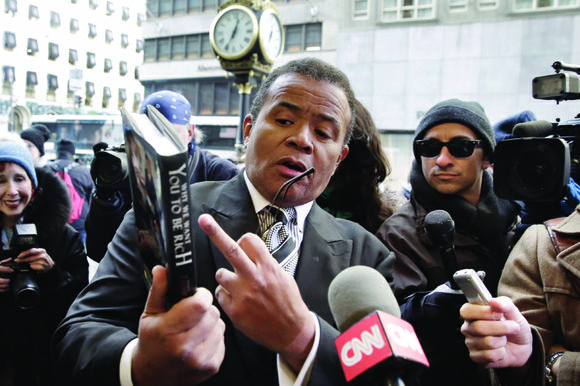Church must boot Parson to clear bankruptcy
Jeremy M. Lazarus | 12/25/2015, 1:56 a.m.
The future of an embattled South Side church may hinge on whether it can completely cut ties with its founding pastor.
As part of a financial plan clearing the way for the once giant Richmond Christian Center to emerge from bankruptcy, the church had to agree to one stipulation — that Pastor Steven A. Parson Sr. “have no contact” with the worship center he founded in his living room more than 32 years ago.
The five-year plan was approved last week in U.S. Bankruptcy Court and will go into effect Jan. 1.
Whether the church can stick to that promise — vital to preventing a default on its mortgage — remains to be seen as members continue the hard work of restoring financial stability to the church in the 200 block of Cowardin Avenue.
For now, Pastor Parson is keeping mum about his prospects of regaining the pulpit. His only comment to a Free Press reporter: “I have nothing to say to you.”
Pastor Parson received national attention in late November when he joined other African-American ministers in endorsing billionaire Donald Trump’s bid for the Republican nomination for president.
The endorsement proved controversial. RCC quickly had to distance itself from Pastor Parson and the endorsement after receiving angry calls and emails. Church officials, who said Pastor Parson did not speak for the church, feared his endorsement could impede their fundraising efforts to get out of bankruptcy.
Apparently, Pastor Parson has had little contact with the church since last February when he was removed from the board of trustees and stripped of a financial role in the church.
Pastor Parson also took unpaid leave from the pulpit after Bruce Matson, the bankruptcy court-appointed trustee alleged that he had improperly diverted property and church funds to benefit himself and his family.
According to Mr. Matson, the pastor’s actions helped create the downward spiral that ultimately sent the church seeking financial protection of the U.S. Bankruptcy Court to survive.
Despite that, Pastor Parson still calls himself the senior pastor of Richmond Christian Center and the church has continued to list him that way.
That could change, at least for the church. The church’s main secured creditor, Foundation Capital Resources of Missouri, has insisted that Pastor Parson be barred from any involvement with the center.
That stipulation was the only way that FCR would agree to revamp the $2 million mortgage it holds on the property and cut the church’s monthly payment by $8,000 a month — a key element of the financial reorganization plan.
“This stipulation is to remain in effect for the duration of the loan term,” said Rhonda Hickman, chair of the church’s three-member board of trustees. The board has worked long hours with the court’s trustee, Bruce Matson, and a financial adviser to come up with a plan that could pass muster with the court.
“We are hopeful that after we show at least six months of financial stability that FCR will reconsider this term,” Ms. Hickman said.
But that’s down the road. The church has been using unpaid associate pastors and volunteer ministers since the church stopped paying Pastor Parson. Ms. Hickman said the church plans to continue the practice into June to save money. Ms. Hickman said the church then could consider bringing on a full-time pastor.
For now, the church is celebrating the prospects of a brighter future.
The church received an early Christmas gift when federal Bankruptcy Court Judge Keith Phillips approved the financial plan.
“I always believed this moment would come. I didn’t know when. I just believed that, with God’s help, we would reach this point,” Ms. Hickman said.
The financial plan calls for the church to repay 100 percent of the money owed to unsecured creditors within three years.
The plan relies heavily on the tightly knit congregation continuing to contribute $30,000 to $55,000 a month in tithes and donations — or an average of about $300 a month per member.
The plan also relies heavily on the work of Forando B. Holmes and Michelle G. Tinkler, owners of Ujima Properties Inc. Together, they have creatively filled much of the church complex’s empty space with small businesses that have created a beehive of activity and are on track to generate more than $250,000 a year in rent for the church.
Just as importantly, the company is contributing to the church’s solvency by agreeing to defer fees for the property rental for two years, Ms. Hickman said.
Still, the church might have gone belly up without the help of Mr. Matson and the professionals who crafted the financial plan.
Required to raise $200,000 to help pay administrative costs, the church was still $93,000 short just a few days before the court’s Dec. 17 deadline.
Aided by fundraising and a surprise $10,000 anonymous donation, the church crossed the hurdle during a meeting with Mr. Matson, accountants and others.
In a show of goodwill, all of the professionals agreed to defer payment of their fees for up to two years, rather than requiring an immediate payment. For example, Paul Campsen of Kaufman & Canoles, the law firm representing FCR, also agreed to defer about $57,000 due to his firm to help make the financial plan work, according to court testimony. Others also contributed to make the plan work.
“This is what bankruptcy is all about,” Chris Perkins, an attorney with LeClair Ryan law firm that represented Mr. Matson. In order to solve the problem of helping the church get on its feet, “everyone had to bend a little and give a little.”








